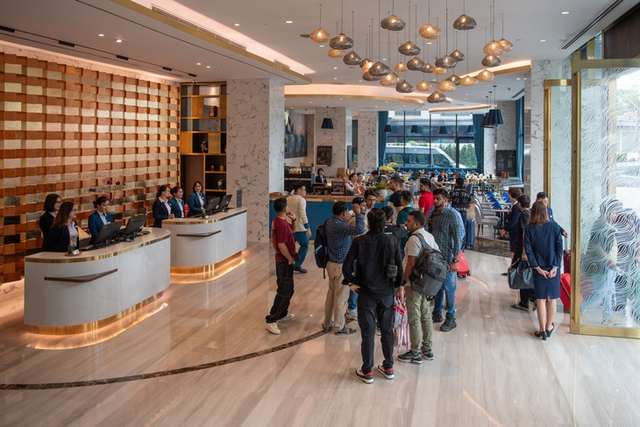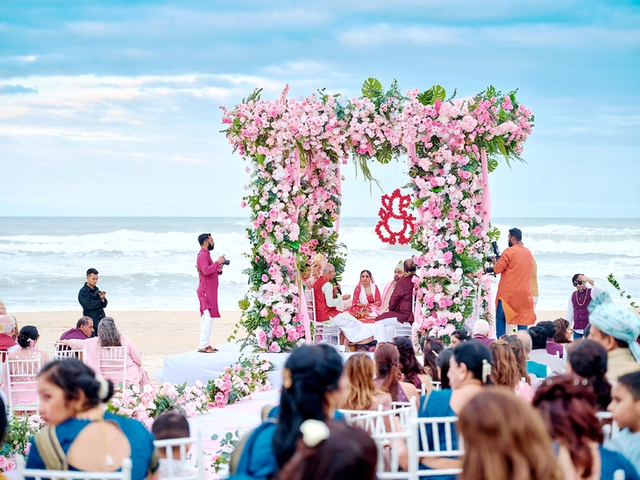
Vietnam rolls out red carpet for high-profile foreigners with new visa waiver policy
The Vietnamese government on Friday issued a decree on a limited-term visa waiver scheme for foreign nationals in specially designated categories whose presence is deemed beneficial to the country’s socio-economic development. This move is expected to boost the tourism sector, particularly the high-end segment.
With the new visa policy, which will take effect on August 15, international visitors from six special categories will find it easier than ever to enter Vietnam.
Eligible individuals include guests invited by top national leaders such as the Party General Secretary, the State President, the Chair of the National Assembly, the Prime Minister, the Standing Member of the Party Central Committee's Secretariat, vice heads of the state, National Assembly and government, the Chair of the Vietnam Fatherland Front Committee, the Chief Justice of the Supreme People’s Court, the Prosecutor General of the Supreme People’s Procuracy, the State Auditor General, ministers and equivalent officials, as well as provincial and municipal leaders.
They are also scholars, experts, scientists, university professors, chief engineers, and high-quality human resources in digital technology; investors and executives from the world’s 100 largest corporations; cultural, artistic, sports and tourism figures with a positive public influence; Vietnam’s honorary consuls abroad; and guests of designated research institutes, universities, and large enterprises, as approved by ministries, ministerial-level agencies, government agencies, and the government.
Other individuals eligible for special visa-free entry for diplomatic or socio-economic purposes, as decided by the Minister of Public Security, are also in the list.
Visa waiver conditions
To qualify for Vietnam’s special visa waiver policy, individuals must hold a valid passport. For diplomatic guests, a formal notification from a competent agency or organization is required.
Experts and influential figures in education, culture, arts, sports, and tourism, and investors must have a written request from a ministry, ministerial-level agency, or a relevant Party or National Assembly agency.

Mövenpick Living West Hanoi welcomes nearly 300 guests from the 4,500-member entourage of an Indian billionaire. Over the past few years, many wealthy Indians have chosen Vietnam to host their weddings. Photo: Thanh Dong
Guests invited by research institutes, universities, large enterprises, and other individuals eligible for special visa waivers must also have a supporting letter from the relevant authority or organization.
Eligible individuals must not fall under any immigration restrictions or exit suspensions as prescribed by Vietnam’s Law on Entry, Exit, Transit, and Residence of Foreigners.
The special visa waiver comes in two forms: an electronic card and a physical chip-based card. Both have equal legal value.
Authorized agencies or organizations may choose to issue either the electronic or physical visa waiver card to the applicant.
Under this policy, foreign nationals may enter Vietnam multiple times using the special visa waiver card within its validity period.
The visa-free period is valid for up to five years and must be at least 30 days shorter than the remaining validity of the passport.
According to the new decree, holders of the special visa waiver card will be granted a 90-day temporary residence permit upon each entry.
If the card’s remaining validity is shorter than 90 days, the temporary residence will match the card’s validity.
If an extension is needed, the holder may apply for a residence extension, a visa or a temporary residence card in accordance with Vietnam’s law.
The decree also authorizes the Ministry of Public Security to revoke special visa waiver cards in cases where the foreign national no longer meets the eligibility criteria or based on a written notification from a competent authority or organization.
Boosting high-end tourism
With the introduction of the new visa policy, Vietnam is now extending a warm welcome to investors, experts, scholars, artists, athletes, and globally influential individuals.
Dr. Pham Ha, CEO of Lux Group, told Tuoi Tre (Youth) that regional neighbors have long implemented similar visa policies to attract investment and even second-home residents.
Though a late adopter, Vietnam now holds strong potential to lure elite visitors for investment or travel. This policy simplifies access for the wealthy and experts.
Ha categorized luxury travelers into the powerful, influential, and wealthy, who typically travel frequently and with peers of similar status.
For tourism businesses, this policy is a strong marketing message for their target clientele. For Lux Group, they are luxury travelers, Ha noted.
Nguyen Nguyet Van Khanh, marketing director at local travel company Vietravel, sees the policy opening up unprecedented opportunities for designing high-end, personalized, and elite-targeted travel products.
Customers eligible for the new visa waiver policy have a high frequency of entry and exit, exceptional service needs, and strong financial capacity. Product lines such as unique cultural experiences, Silk Road luxury tours, wellness and golf retreats are appropriate for them.
With a long stay allowance of up to 90 days per entry, which can be extendable, travel agencies can craft extended, VIP itineraries, clearly differentiating themselves in the international market.
Nguyen Lam Nguyen, deputy director of the Department of Culture, Sports and Tourism in Quang Ninh Province, northern Vietnam, said attracting ultra-wealthy tourists boosts revenue and enhances Ha Long Bay’s and the province’s brand.
The special visa policy helps lure high-spending clientele.
Visa waiver scope expansion likely
Vietnam has increasingly become a go-to destination for elite travelers—from Indian billionaires to global tech figures like Microsoft founder Bill Gates, Meta founder Mark Zuckerberg, Samsung chairman Lee Jae‑yong, Nvidia CEO Jensen Huang, and Apple CEO Tim Cook.
Vietnam’s blend of stunning beaches, rich culinary heritage, and vibrant culture is particularly appealing to affluent travelers who favor tailored experiences, according to Ha from Lux Group.
Tourism infrastructure, including ports, airports, and luxury resorts, has rapidly advanced. Businesses need to adopt a customer-centric mindset to meet the needs of high-end visitors.

A wedding party of an Indian couple at a five-star resort in Da Nang City, central Vietnam. Photo: Tuoi Tre
Ha suggested that retirees are a promising target. They have both time and wealth.
He expects more wealthy and tech-savvy travelers will visit Vietnam soon. However, he hopes the visa policy will be further expanded as the current special visa policy covers only a tiny fraction of total inbound luxury travelers.
He also proposed extending the special visa validity to 10 years. The policy should encompass major investors, million-dollar business owners, frequent business travelers, retirees, and those who have lived in Vietnam for many years.
Repositioning Vietnam’s tourism brand
Other Southeast Asian countries have successfully adopted golden visa programs, specifically Singapore in 2004, Indonesia in 2024, Malaysia in 2002, and Cambodia in 2022.
According to Ha, though Vietnam's tourism is growing, it needs a systematic strategy with effective marketing and promotion.
To attract high-spending visitors, it must reinforce its brand, experience, image, and visa friendliness. Targeted communication is essential.
Bui Thanh Tu, communications director at BestPrice, emphasized that tourism should measure revenue rather than number of visitors.
He believes promoting the availability of luxury services and friendly visa policies to the right clients is vital.
Thanh Ha - Nguyen Hien / Tuoi Tre News
Link nội dung: https://news.tuoitre.vn/vietnam-rolls-out-red-carpet-for-high-profile-foreigners-with-new-visa-waiver-policy-103250810165407073.htm